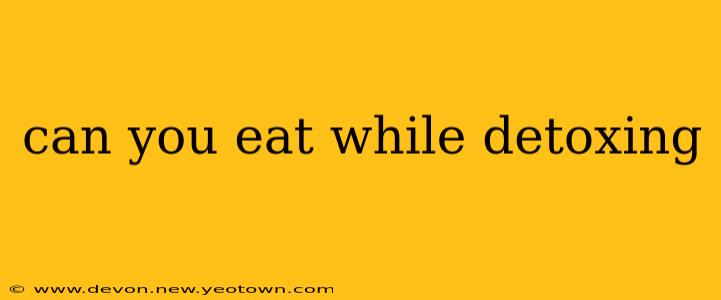Can You Eat While Detoxing? Navigating the Confusing World of Detox Diets
The question, "Can you eat while detoxing?" is a surprisingly complex one. The answer, unfortunately, isn't a simple yes or no. It hinges entirely on what kind of "detox" you're talking about. The term itself is often thrown around loosely, and unfortunately, many detox programs are based on misleading claims and lack scientific backing. Let's unravel this mystery together.
First, let's address the elephant in the room: your body already has a built-in detoxification system. Your liver, kidneys, and lymphatic system work tirelessly every day to filter out toxins. Therefore, any "detox" promising miraculous results is likely overselling its capabilities. The idea of needing a special cleanse to rid your body of harmful substances is mostly a marketing ploy.
However, this doesn't mean the concept of supporting your body's natural detoxification processes is entirely unfounded. A healthy lifestyle is the best "detox" you can undertake. This brings us back to the question of eating.
Can you eat while following a detox diet? What does that even mean?
The answer depends entirely on the specific "detox" plan. Many "detox diets" involve severely restricting your food intake – sometimes to the point of starvation or consuming only juices. These extreme approaches are generally not recommended. They can lead to nutrient deficiencies, muscle loss, and even disrupt your metabolism. A healthy, balanced diet provides the necessary nutrients your body needs to effectively function, including detoxification.
What are the risks of not eating during a detox?
Depriving your body of essential nutrients can have serious consequences. Your body needs energy to perform its functions, and drastically cutting calories can lead to:
- Nutrient deficiencies: Lack of essential vitamins and minerals can weaken your immune system and negatively impact your overall health.
- Muscle loss: Your body may start breaking down muscle mass for energy if it's not receiving enough calories from food.
- Metabolic slowdown: Extreme calorie restriction can cause your metabolism to slow down, making it harder to lose weight in the long run.
- Fatigue and weakness: Lack of energy from sufficient food intake will leave you feeling drained and unable to function effectively.
- Headaches, dizziness, and nausea: These are common side effects of extreme dieting and can be quite debilitating.
What should I eat if I want to support my body's natural detoxification processes?
Instead of following restrictive detox diets, focus on a balanced, nutrient-rich diet. This is the best way to support your body's natural detoxification processes. Include plenty of:
- Fruits and vegetables: Rich in antioxidants that help protect your cells from damage.
- Whole grains: Provide fiber, which helps eliminate toxins from the digestive system.
- Lean protein: Essential for building and repairing tissues.
- Healthy fats: Crucial for hormone production and overall health.
- Plenty of water: Water is essential for flushing out toxins.
What are some healthy habits to support detoxification?
Beyond diet, there are other lifestyle choices you can make to support your body's natural detoxification processes:
- Regular exercise: Helps improve circulation and lymphatic drainage.
- Sufficient sleep: Allows your body to repair and regenerate.
- Stress management: Chronic stress can negatively impact your body's detoxification processes.
- Limit alcohol and caffeine consumption: These substances can put added strain on your liver and kidneys.
Is it okay to juice cleanse as part of a detox?
Juice cleanses are often promoted as a quick way to detox, but they can be problematic. While juice can provide some vitamins and nutrients, they often lack fiber and can lead to blood sugar spikes. Moreover, they can be quite low in calories, causing the negative effects of calorie restriction discussed above. If you choose to include juices as part of your diet, they should be considered a supplemental part of a balanced meal plan, not a replacement.
In conclusion, eating while aiming for a healthier lifestyle is crucial. Focus on a balanced diet and healthy habits rather than following potentially harmful detox diets. True detoxification is a continuous process, not a quick fix. Nourishing your body with nutrient-rich foods and adopting a healthy lifestyle is the best way to support your body's natural detoxification mechanisms.

